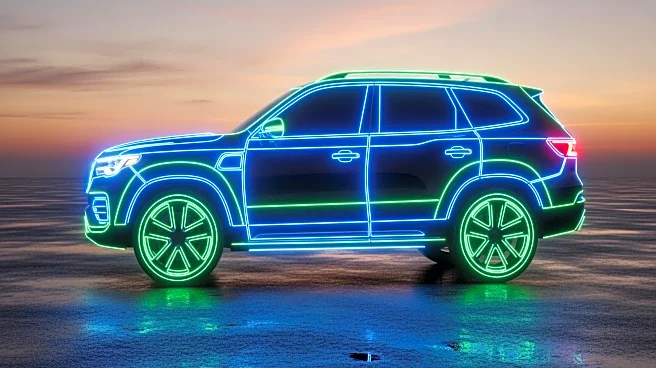What's Happening?
Jeep has introduced its new battery-electric SUV, the Recon, at the LA Auto Show, alongside refreshed models of the Jeep Cherokee, Grand Cherokee, and Grand Wagoneer. These models offer a mix of gas-powered,
hybrid, plug-in, and extended-range electric vehicle (EREV) propulsion systems. The Recon, with a 250-mile all-electric range, is designed to cater to Jeep's off-road enthusiasts while marking a significant step in the brand's electrification journey. Jeep's diverse powertrain offerings reflect a strategic adaptation to changing leadership and market priorities. The brand aims to rebuild consumer and dealer confidence after years of instability, highlighted by a September 2024 letter from the Stellantis National Dealer Council criticizing former CEO Carlos Tavares. Jeep's new CEO, Bob Borderdorf, expressed optimism about the Recon's reception, emphasizing its appeal to various customer segments, including those seeking a 'Jeep lifestyle' and mainstream EV buyers.
Why It's Important?
Jeep's move towards electrification is crucial as the automotive industry faces increasing pressure to reduce emissions and adapt to evolving consumer preferences. The introduction of the Recon and other electrified models positions Jeep to compete in the growing EV market, which is essential for maintaining relevance and market share. The diverse powertrain options provide flexibility to meet varied consumer needs, potentially attracting a broader customer base. Rebuilding dealer confidence is vital for Jeep's success, as strong dealer relationships are key to effective distribution and customer service. The brand's ability to adapt and innovate amidst industry shifts could serve as a model for other automakers navigating the transition to electric vehicles.
What's Next?
Jeep's focus will likely be on ensuring the successful launch and market acceptance of the Recon and other electrified models. The company may continue to refine its powertrain offerings to align with consumer demand and regulatory requirements. Dealer engagement and confidence will be critical, with Jeep expected to strengthen its relationships through consistent product delivery and support. As the automotive industry continues to evolve, Jeep's strategy may involve further investments in electrification and technology to enhance its competitive edge. Monitoring consumer feedback and sales performance will be essential to guide future product development and marketing strategies.
Beyond the Headlines
Jeep's electrification strategy highlights broader industry trends towards sustainable mobility solutions. The shift to electric vehicles raises questions about infrastructure readiness, such as charging stations and grid capacity, which are critical for widespread EV adoption. Additionally, the transition may impact employment within the automotive sector, as manufacturing processes and skill requirements evolve. Jeep's approach underscores the importance of balancing innovation with brand identity, ensuring that new technologies enhance rather than dilute the core values that attract loyal customers. The brand's ability to navigate these challenges will influence its long-term success and contribute to shaping the future of the automotive industry.









